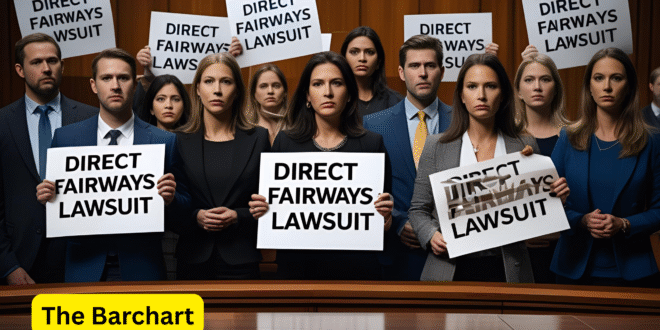The Direct Fairways lawsuit has stirred considerable controversy in the marketing and golf industries alike.
With multiple allegations, including deceptive practices, unsolicited communication, and financial misconduct, the company is now facing severe legal scrutiny.
This article explores the intricacies of the case, from initial complaints to industry-wide implications, providing a comprehensive look into how a once-popular golf course marketing agency came under legal fire.
Lucombe v. Direct Fairways LLC: TCPA Violation Case
One of the most prominent cases filed against Direct Fairways is Lucombe v. Direct Fairways LLC, which centers around violations of the Telephone Consumer Protection Act (TCPA).
Filed in 2024 by Nigel Lucombe, the lawsuit claims that Direct Fairways engaged in unsolicited telemarketing practices.
The TCPA mandates strict regulations for how and when businesses can contact individuals, especially through automated calls or texts.
Lucombe alleges that despite not giving explicit consent, he received persistent marketing communications from the company, which caused undue stress and invasion of privacy.
What makes this case significant is its potential to influence how marketing companies engage with potential clients moving forward.
If Direct Fairways is found guilty, it could lead to heightened enforcement of TCPA guidelines across all industries, especially within niche sectors like golf marketing.
The lawsuit is also indicative of broader problems within the company’s operational model, suggesting that Direct Fairways may have employed aggressive tactics to generate leads, possibly in violation of federal laws.
The outcome of this case could set an important legal precedent for similar cases in the future.
Class Action Lawsuit Over Deceptive Marketing Practices

At the heart of the controversy is a sweeping class action lawsuit accusing Direct Fairways of deceptive marketing practices.
Filed by several golf course owners and small business clients, the suit alleges that the company promised high-quality promotional services but consistently failed to deliver.
Clients were reportedly charged substantial upfront fees for advertising materials and exposure that never materialized.
In some cases, marketing products were subpar or entirely nonexistent, leading many to suspect intentional fraud.
This class action represents a collective voice from clients who felt misled and financially exploited.
Legal documents suggest that the company exaggerated its marketing reach and success rates during sales pitches, convincing clients to invest in services that yielded little to no return.
What amplifies the seriousness of this lawsuit is the consistency of complaints across different states and client types, indicating a systemic problem rather than isolated incidents.
If successful, this class action could result in significant financial penalties and forced operational reforms for Direct Fairways.
It may also embolden other small businesses to stand up against marketing firms that engage in questionable practices, potentially ushering in a new era of accountability within the industry.
Impact on Golf Industry Marketing Practices
The Direct Fairways lawsuit has sent ripples across the golf marketing sector, raising important questions about ethics, transparency, and the sustainability of outsourced advertising services.
For years, Direct Fairways positioned itself as a leading solution for golf course promotions, offering customized scorecards, signage, and digital marketing strategies.
However, the legal challenges have forced many golf course operators to reevaluate their reliance on third-party firms for marketing.
One of the immediate impacts has been a loss of trust.
Golf course owners are becoming more cautious when choosing marketing partners, seeking clear contracts, performance guarantees, and more transparency in deliverables.
Some are even opting to bring marketing operations in-house to retain control and oversight.
Additionally, industry associations are starting to provide educational resources to help businesses avoid falling into similar traps.
The case also underscores the need for regulatory standards in niche marketing industries.
With few rules governing how these specialized services operate, unethical companies can exploit unsuspecting clients.
As the lawsuit against Direct Fairways unfolds, it’s likely that we will see more structured guidelines and checks introduced to protect small businesses in the golf sector and beyond.
Direct Fairways’ Defense and Denial of Wrongdoing
In response to the allegations, Direct Fairways has firmly denied any wrongdoing.
The company maintains that it provided legitimate marketing services and that the dissatisfaction expressed by some clients is the result of unrealistic expectations or communication breakdowns.
According to statements released by their legal team, Direct Fairways argues that its advertising products were delivered as promised, and that complaints represent only a small fraction of its overall client base.
The defense hinges on proving that the company did not intentionally deceive clients and that any discrepancies in service were unintentional or due to miscommunication.
They also argue that many clients saw tangible results from the marketing efforts, pointing to testimonials and case studies as evidence.
Furthermore, Direct Fairways has attempted to shift the narrative by emphasizing the challenges of operating in a rapidly evolving digital landscape, where results are not always immediate.
Despite these assertions, the mounting evidence presented by plaintiffs paints a different picture.
Legal experts suggest that unless the company can provide substantial proof of service delivery and client satisfaction, their defense may not hold up in court.
Nonetheless, their denial of responsibility is a critical part of the legal narrative and will play a key role in shaping the outcome of the case.
Legal Proceedings and Timeline
The legal journey of the Direct Fairways lawsuit has been extensive and complex, involving multiple cases across various jurisdictions.
Key milestones include the Lucombe case in late 2024 and various pre-trial hearings where both plaintiffs and defense teams presented evidence and arguments.
The discovery phase revealed internal communications that, according to plaintiffs, suggested a pattern of deceptive sales tactics.
As of mid-2025, the case is entering the trial phase, where a judge—or possibly a jury—will determine the extent of Direct Fairways’ liability.
Legal analysts believe the outcome will have lasting implications, not just for the company but for marketing service providers at large.
The evolving timeline illustrates the seriousness of the allegations and the thoroughness with which the courts are addressing them.
Rebranding as ‘Golf Marketing Company’
Amid the legal turmoil, Direct Fairways reportedly attempted to rebrand itself as the “Golf Marketing Company.”
This move has been widely interpreted as an effort to distance the business from its tarnished reputation.
However, critics argue that the rebranding is superficial and fails to address the core issues that led to the lawsuits in the first place.
Customers and former clients quickly recognized the connection between the two entities, raising questions about transparency and ethical conduct.
Rebranding in the middle of an ongoing legal battle can often appear as an attempt to evade accountability, and in this case, it has only deepened public skepticism.
Legal observers have noted that if the rebranded entity continues similar practices under a new name, it could face additional lawsuits for fraudulent concealment.
Regulators may also investigate whether the name change violates consumer protection laws.
The rebranding saga serves as a reminder that changing a company’s name does not absolve it of its past actions, and any attempt to mislead stakeholders can backfire dramatically.
Consumer Complaints and Refund Challenges
One of the most troubling aspects of the Direct Fairways controversy is the volume and consistency of consumer complaints.
Clients from across the country have reported being charged thousands of dollars for marketing services that were either poorly executed or never delivered at all.
Many attempted to request refunds, only to face bureaucratic delays, unresponsive customer service, and outright denials.
These challenges have been documented in online reviews, complaint boards, and legal affidavits.
Some customers claim that refund requests were met with aggressive tactics, including threats of legal action or blacklisting.
Others reported that the company would promise partial refunds that never materialized, effectively leaving them without recourse.
The refund issues have played a central role in fueling the class action lawsuit.
They suggest a systemic failure within the company’s customer service and quality assurance departments.
Employee Insights into Company Practices
Former employees of Direct Fairways have come forward with troubling accounts of internal operations.
According to interviews and online testimonials, sales representatives were allegedly pressured to close deals using aggressive tactics and misleading claims.
Training materials reportedly encouraged reps to exaggerate the reach and effectiveness of the company’s marketing products.
These insider perspectives paint a picture of a high-pressure sales environment where closing a deal took precedence over ethical considerations.
Employees also described chaotic management, inadequate support systems, and a lack of clear deliverables.
Some former staff members expressed regret for their involvement, stating that they were unaware of the full extent of the company’s practices when they were hired.
Employee testimonies have added credibility to the plaintiffs’ claims and may influence the outcome of the lawsuit significantly.
Courts often consider insider accounts as strong evidence, especially when they align with consumer complaints.
These revelations highlight the importance of ethical training and compliance within marketing organizations to prevent similar issues in the future.
Legal Basis for Lawsuits: Negligence and Misrepresentation
The lawsuits Direct Fairways rest on two primary legal pillars: negligence and misrepresentation.
Plaintiffs argue that the company failed to exercise reasonable care in delivering its services, thereby breaching contractual and fiduciary duties.
Additionally, they allege that Direct Fairways knowingly misrepresented its capabilities, client outcomes, and service terms during sales interactions.
Negligence claims assert that Direct Fairways did not meet industry standards for marketing delivery.
For instance, some clients received outdated or incorrectly branded materials, while others saw no marketing activity despite having paid in advance.
Misrepresentation, on the other hand, centers on the idea that the company intentionally provided false information to close deals.
These legal concepts are significant because they carry different burdens of proof.
Proving negligence often requires expert testimony, whereas misrepresentation hinges on demonstrating intent.
Both, however, are serious accusations that can lead to substantial financial penalties, business restrictions, and reputational damage if proven in court.
Regulatory Scrutiny and Potential Industry Reforms

The Direct Fairways case has not gone unnoticed by regulatory authorities.
Several consumer protection agencies are reportedly monitoring the situation closely, with some even launching independent investigations.
If the lawsuits result in judgments against the company, it could trigger a wave of industry reforms aimed at curbing deceptive marketing practices.
Regulators may push for more stringent licensing requirements, clearer service contracts, and transparency in marketing performance metrics.
These changes would protect small businesses from falling victim to similar schemes in the future.
Additionally, the case may encourage industry associations to adopt best practice guidelines, providing a framework for ethical conduct.
The broader impact of regulatory scrutiny is twofold.
First, it may restore some degree of trust among clients who rely on third-party marketing services.
Second, it places pressure on marketing firms to audit their own practices, ensuring they comply with evolving legal and ethical standards.
In this way, the Direct Fairways lawsuit could serve as a turning point for the entire industry.
Conclusion
The Direct Fairways lawsuit is more than just a legal battle—it is a wake-up call for the marketing industry.
With accusations ranging from TCPA violations to fraudulent misrepresentation, the case underscores the importance of ethical business practices, transparency, and client respect.
As proceedings continue, the outcome will likely reshape how marketing companies operate, especially in niche sectors like golf advertising.
Whether Direct Fairways is ultimately found guilty or not, the spotlight on its business model has already triggered significant discussions across legal, regulatory, and industry circles.
For businesses seeking marketing support, this case serves as a powerful reminder to conduct thorough due diligence and demand accountability from service providers.




